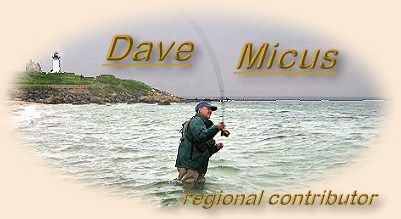|
Though I fish from a kayak almost every day
during the striped bass season, I really prefer
to use the boat as transportation to get me to
places I couldn't otherwise reach. Fishing from
a kayak has its limitations; because of its low
profile it's difficult to cast any distance, and,
opposite of shore fishing where the fish move and
you can't, you'll find in the kayak the fish
stationary but you're moving with the current.
So my preference is to beach the kayak and fish
from shore. When the fish move I launch and follow.
And that was this evening's strategy. High tide was
10:08, a storm loomed on the horizon, and I figured
that this added up to the bass gorging on baitfish
in the bay in front of my house from dusk, 7:36,
until the storm drove them deeper. I'd launch and
paddle to the marsh island off shore, get out and
fish, and time it so I'd be on the water during
the frenzy, but home before the tempest. At least
that was the plan.
My initial instincts were true. Before I even
reached the wide channel I planned to fish I could
see terns diving and hear the 'pop' that sounds
like a small caliber firearm and is bass slashing
bait on the surface. I quickened the pace and came
on the largest school of bass feeding that I've seen
all year. They were in the middle of the channel,
too far a cast from the bank, so I fished from the
boat. I was on quickly, landed the fish, paddled
back to position, cast, and was on again. It would
have been repetitive but fishing never is, the only
pause between hooking fish being the time it took to
paddle back to the school after being pulled away
by the current.
All fly fishers are a bit A.D.D., one of the symptoms
being a hyper-focus that precludes the intrusion into
consciousness of anything except you and the fish.
In the middle of a feeding frenzy I failed to notice
that the sky had been all the while fading to black.
The bass vanished with the first growl of thunder.
Lightning fractured the heavens and the sky collapsed
under the weight of the rain. The route home wasn't
very long, maybe 600 yards, but it was across an open
bay where, even sitting in a yak, I'd be not only the
tallest structure for two square blocks, but the only
structure with two lightning rods, a graphite fly rod
and a metal paddle. Not taking the chance, I sculled
to a point about 75 yards away that my kids had
christened 'rock island' because of a pile of very
large rocks in an area otherwise barren of stone
and is probably the remains of a colonial wharf.
I beached the yak and hunkered down among the large
stones, counting the time between seeing a lightning
strike--one Mississippi, two Mississippi--and hearing
the thunder to determine if the storm was coming
closer or moving away. I mined my memory for
facts about lightning, things like lightning
strikes the earth about 100 times per second,
and approximately 80 people die each year in
the United States from being struck by lightning,
but actually I read those later. The only thing
I remembered, other than the counting between
flash and sound, was the arcane tidbit that
you are more likely to be struck by lightning
than attacked by a shark-a statistic meant to
coddle salt water swimmers but not much comfort
in my current predicament. (I wonder if anyone
has been struck by lightning while being
attacked by a shark. What would the odds be?)
But I've always cherished lightning storms, and
I can remember as a child sitting on my front
porch in Chicago, spellbound by the dramatic
squalls so common in the mid-west. My mother,
assuming I was scared, told me that storms were
"God bowling." "Yea, and we're the pins," my
oldest brother added, which, though meant to,
didn't frighten me. And I wasn't frightened
now; the rain, though a deluge, was refreshing,
the lightning a treat, and I had skybox seating
to one of nature's more dramatic performances.
The gods, as Dylan Thomas said, were thumping
the clouds. I stayed for the entire show, but
headed for home before the encore.
Out of habit I trolled a fly behind the yak,
and, about 200 yards from shore, I had a
tremendous hit that instantly snapped the
leader at the knot. This is 20lb fluorocarbon
that I had replace the day before, tied with
a Bimmini, rated at 100% line strength, and
it would take a very large fish to break off
that quickly. I reeled in to rerig, hoping
to catch a classmate, but a stray bolt of
lightning suggested a wiser course. Once home
I put on warm, dry clothes and a pot of coffee,
then moved to the porch and watched as the storm
blew out to sea. ~ Dave
About Dave:
 Dave Micus lives in Ipswich, Massachusetts. He is an
avid striped bass fly fisherman, writer and instructor.
He writes a fly fishing column for the Port City Planet
newspaper of Newburyport, MA (home of Plum Island and Joppa Flats)
and teaches a fly fishing course at Boston University.
Dave Micus lives in Ipswich, Massachusetts. He is an
avid striped bass fly fisherman, writer and instructor.
He writes a fly fishing column for the Port City Planet
newspaper of Newburyport, MA (home of Plum Island and Joppa Flats)
and teaches a fly fishing course at Boston University.
|



